Philippine Normal University
The Philippine Normal University (PNU; Filipino: Pamantasang Normal ng Pilipinas[3]) is a public research university in Manila, Philippines established during the early days of American colonial rule. Pursuant to Republic Act No. 9647, it is now funded and operated as a National Center for Teacher Education.[4]
Pamantasang Normal ng Pilipinas | |
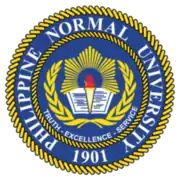 | |
Former names |
|
|---|---|
| Motto | Truth. Excellence. Service. |
| Type | National university Research university |
| Established | September 1, 1901 |
Academic affiliations | |
| President | Bert J. Tuga[2] |
| Vice-president |
|
| Location | , 14°35′16″N 120°58′59″E |
| Campus | |
| Hymn | O, Alma Mater Ko |
| Colors | Royal blue and Gold |
| Nickname | Torchbearers |
Sporting affiliations | SCUAA-NCR |
| Mascot | Inang Pamantasan |
| Website | www |
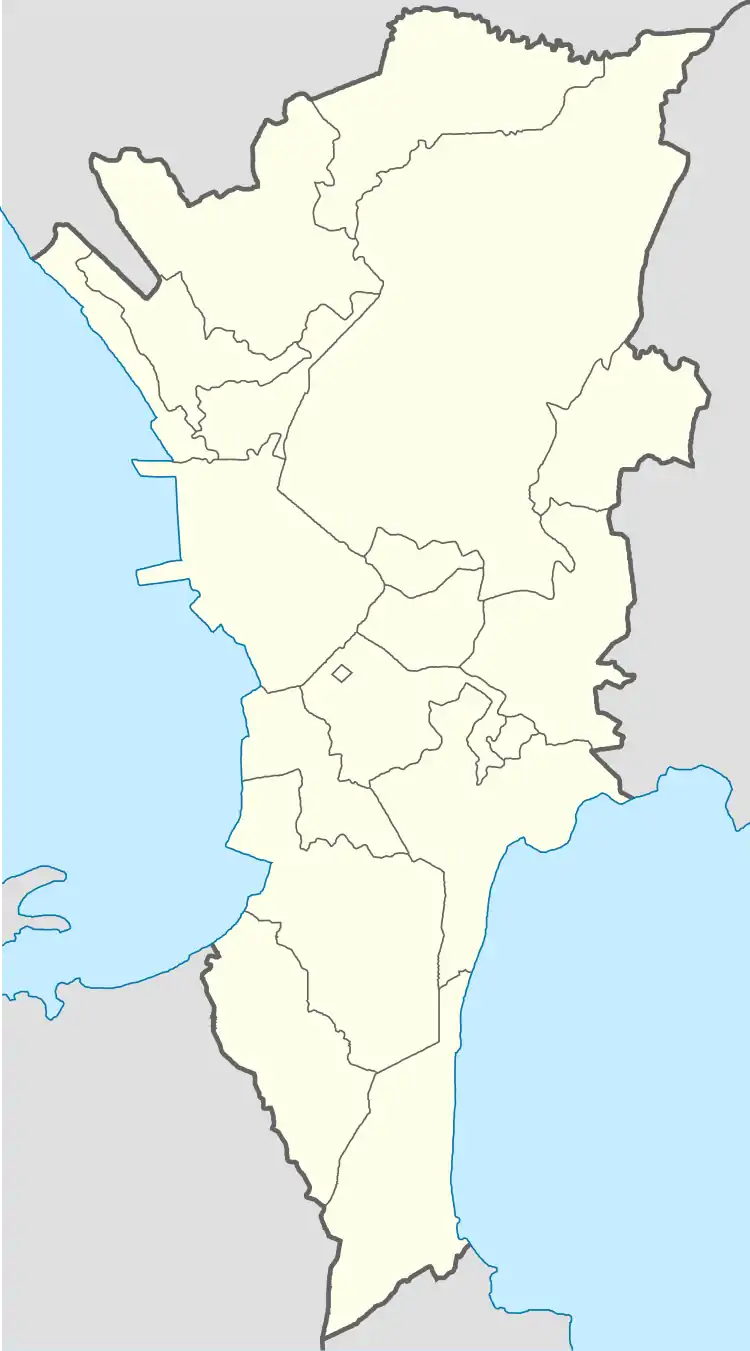 Location in Metro Manila .svg.png.webp) Philippine Normal University (Luzon) .svg.png.webp) Philippine Normal University (Philippines) | |
History
Early history
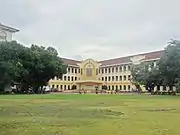
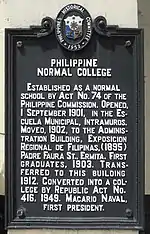
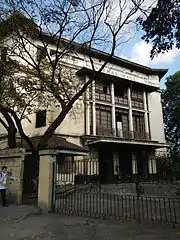
The Philippine Normal University was originally established as the Philippine Normal School (PNS) by virtue Act No. 74 of the Philippine Commission, which traces its roots to the Escuela Normal de Maestros or Normal School for (Male) Teachers, created by a Spanish Educational Decree of 1863.[5] Enacted on January 21, 1901, the Philippine Commission mandated for the establishment of a normal and trade school. The Philippine Normal School formally opened on September 1, 1901 on the site of the former Spanish Normal School in the Escuela Municipal in Intramuros. It served as an institution for the training of teachers.[6]
Conversion into college
For more than two decades, PNS offered a two-year general secondary education program. In 1928 it became a junior college offering a two-year program to graduates of secondary schools.
When PNS was converted into the Philippine Normal College (PNC) in 1949 through Republic Act No. 416 (also known as the PNC Charter), the four-year Bachelor of Science in Elementary Education (BSEE) program was introduced. Subsequently, other undergraduate programs started, such as the Bachelor of Science in Education (BSE) with specialization in Elementary Education; a BSEE major in Home Economics; and a three-year Combined Home Economics diploma.
In 1953, the Graduate School was established. PNC included the Master of Arts (MA) in Education curriculum in the academic program. The organization of a full-fledged Graduate School came five years later.[7]
In 1970 the Bachelor of Science in Education curriculum, offering major and minor subjects, was introduced. The passage of Republic Act No. 6515 in July 1972, which amended Republic Act No. 416, paved the way for the offering of the Doctor of Education (Ed.D.) and the Doctor of Philosophy (Ph.D.) degrees and the provision of other academic programs relevant to the in-service training of teachers, school supervisors, administrators, researchers, and other education specialists and personnel.[7]
PNC established branches in Agusan del Sur, Isabela, and Negros Occidental by virtue of Republic Act No. 4242 of 1965.[8]
Aside from the creation of campuses, the college expanded its services, most significant of which was its designation as the Curriculum Development Center for Communication Arts (English and Filipino) under the Language Study Center-Educational Development Projects Implementing Task Force (LSC-EDPITAF) Project and afterward as Center of Excellence (CENTREX) in English, Filipino and Values Education. Its major functions included the development of English and Filipino textbooks and teacher manuals for use in public elementary and secondary schools nationwide, and the conduct of national level trainers-training programs for the Bureau of Secondary Education, Department of Education, Culture and Sports, and the Fund for Assistance to Private Education.[7]
University status
The school was elevated to university status on December 26, 1991, under Republic Act No. 7168. A fourth campus was constructed in Quezon province. The university was designated as Center of Excellence in Teacher Education (COE) for the National Capital Region and Center of Excellence in Filipino at the national level.
On September 1, 2001, the university celebrated its centennial founding anniversary.[7]
In 2008, it was declared the country's National Center for Teacher Education by virtue of Republic Act No. 9647.[7]
Campuses
Manila
The Manila Campus is the flagship and oldest campus of the university. In 1909, American architect William E. Parsons was tasked by the Philippine Commission to draw up designs for schools to be established in the Philippines.[9][10] In 1911, he designed the Philippine Normal School, which was completed in 1914. It was designed using the California Mission style to juxtapose with the capiz window panes and ornately grilled ventanillas. It was erected at the corner of Taft Avenue and Ayala Boulevard. The building, three storeys in height, followed a V-configuration plan, where an auditorium was at the apex, while the rest of its segments were used as classrooms and laboratories linked by corridors. The construction, then budgeted at P374,000, was made of reinforced concrete. The exterior was relieved by panels of glazed polychromatic glazed tiles set in concrete.[9][10]
PNU North Luzon – Hub for Indigenous Education
The PNU North Luzon is the third regional hub of the university based in Cagayan Valley in the municipality of Alicia, Isabela. RA 4242 became the legal basis of its creation, principally authored and sponsored by former Congressman Delfin Albano.
On July 26, 1971, the PNC Isabela Campus was established.
Today, the campus has become one of the most respected teacher training institutions in the region.[11]
PNU South Luzon – Hub for Technology and Livelihood Education
The PNU South Luzon is the fourth regional campus of the University based in the Calabarzon region in the town of Lopez, Quezon. It started in a consortium program in Teacher Education with another emerging campus of the Polytechnic University of the Philippines in 1980.
When the consortium agreement expired in 1993 after almost 13 years of education partnership, the leadership of PNU headed by then President Gloria G. Salandanan, penned a memorandum of agreement with the provincial and local government of Quezon and the Department of Education, Culture and Sports (DECS) to continue the operation of the PNU Teacher Education Program in Lopez, Quezon.
Hence, the campus stayed in the compound of the Lopez National Comprehensive High School from 1993 to 1999. In a span of six years, the young campus had gradually acquired its own one-hectare site through a land donation from the provincial government. The municipal government had pledged another hectare for future expansion. In 1999, the campus transferred to its own site where a two-story building has been constructed.
Presently, PNU South Luzon provides education services and opportunities to students and educators coming from areas in the Southern Tagalog and Bicol regions.[12]
PNU Visayas – Hub for Environment and Green Technology Education
The PNU Visayas in Cadiz City, Negros Occidental was established with the enactment of RA 4242, which was approved on June 9, 1968. This act provided for the establishment of regional branches of PNU. Upon its approval, the late Congressman Armando C. Gustilo immediately worked out the establishment of the branch in the Visayan region. With the help of former Mayor Heracleo Villacin, the PNC Negros Occidental Branch in Cadiz City was opened on July 22, 1968.
From Bachelor of Elementary Education and Bachelor of Secondary Education, its program offerings expanded to include master's degrees and, more recently, doctorate. For a few years, it also offered engineering courses in consortium with Technological University of the Philippines – Visayas.[13]
PNU Mindanao – Hub for Multicultural Education
The PNU Mindanao in Prosperidad, Agusan del Sur was established as a college on August 12, 1968 with the passage of RA 4242 through the efforts of Hon. Jose C. Aquino, then congressman of the lone District of Agusan del Sur.
In the first year of its founding, Bachelor of Science in Elementary Education was offered. A couple of years later, because of the demand of the locality, it ventured into another course, Bachelor of Science in Community Development. A new course, Bachelor of Science in Secondary Education with major in English Language Teaching was opened in 1982 and the course offerings expanded with Mathematics, General Science, Home Economics, Filipino, and Social Studies as alternative fields of specialization. Graduate education followed with offering of specialization courses such as Educational Management, English Language Teaching, Filipino Literature, Science Education, Mathematics Education, Non-Formal Education, Home Economics, and Physical Education.
The Mindanao Hub community has immersed itself in national and local government concerns. It continues to provide leadership in cultural activities for the preservation of folk arts: the music, dance and rituals of the Manobos and Higaonons of the province. For some years, the performing groups managed the staging of rituals and dances of the Manobo tribesmen for cultural festivals, both local and national.[14]
Academics
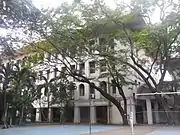
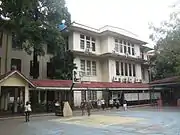
Philippine Normal University was formerly composed of four colleges: College of Arts and Social Sciences, College of Education, College of Languages, Linguistics and Literature, and College of Science. In 2013, the university underwent a new organizational structure by the approval of the Board of Regents establishing three colleges and three institutes.
College of Flexible Learning and e-PNU (CFLeX)
The College of Flexible Learning and e-PNU functions as a degree and non-degree college that manages the university's online undergraduate and graduate degree programs, and continuing education programs.
College of Graduate Studies and Teacher Education Research (CGSTER)
The College of Graduate Studies and Teacher Education Research of the Philippine Normal University is the largest graduate school of education in the country with 12 doctorate programs and 62 masters programs in fields of specialization. It has only one faculty, the Graduate Teacher Education Faculty. CGSTER is in the Pedro Orata Hall of the university.
College of Teacher Development (CTD)
The College of Teacher Development is the undergraduate school of the university that offers bachelor's degree in early childhood, elementary, and secondary education with fields of specialization. The College Dean is assisted by four associate deans of faculties — Arts and Languages (FAL) that houses the fields of English, Filipino, Literature, Music and Arts, and Speech and Theater Arts; Behavioral and Social Sciences (FBeSS) that houses the fields of History, Psychology, Social Sciences, and Values Education; Education Sciences (FES) that houses the fields of Early Childhood Education, Elementary Education and Nutrition and Dietetics; and Science, Technology and Mathematics (FSTeM) that houses the fields of Biology, Chemistry, General Science, Mathematics, and Physics.
Institute of Knowledge Management (IKM)
The Institute of Knowledge Management is concerned with the entire process of discovery and creation, dissemination, and use of knowledge. IKM has one degree granting unit: the School of Information and Knowledge Management that manages and supervises academic programs such as Library and Information Science (LIS) and Information Technology Education (ITEd).
Institute of Physical Education, Health, Recreation, Dance and Sports (IPEHRDS)
The Institute of Physical Education, Health, Recreation, Dance and Sports offers the bachelor's degree in Physical Education and Health, and spearheads the athletic, recreation, and dance events in the university.
Institute of Teaching and Learning (ITL)
The Institute of Teaching and Learning is the basic education unit of the university. It houses the kindergarten, grade school and junior high school students and serves as the training ground for the Field Studies of the Pre-Service Teachers of the university.
Administration
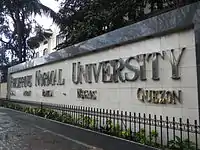
Philippine Normal University - Manila is the seat of administration of all the campuses of the university, directly governed by the Board of Regents and other university officials. The highest official that administers the main campus is the university president while each hubs is administered by its own director. The president is assisted by four vice presidents — for Academics, Finance and Administration, Research, Planning and Quality Assurance, and University Relations and Advancement.
Board of Regents
The Philippine Normal University Board of Regents (Filipino: Lupon ng mga Rehente ng Pamantasang Normal ng Pilipinas) is the highest decision-making body of the university. Constituted by the Republic Act 8292 (commonly known as the Higher Education Modernization Act of 1997)[15] the board is vested with general powers of administration and the exercise of title powers of the corporation.
| Position | Board Member | Designation |
|---|---|---|
| Chairperson | Perfecto A. Alibin | Commissioner, Commission on Higher Education |
| Vice chairperson | Bert J. Tuga | President, Philippine Normal University |
| Secretary | Gerard G. Manuel | Officer-in-Charge, Office of the University Board and Secretary |
| Member | Emmanuel Joel Villanueva | Chairperson, Committee on Education, Arts, and Culture, Senate of the Philippines |
| Member | Mark O. Go | Chairperson, Committee on Higher and Technical Education, House of Representatives |
| Member | Jose Miguel Dela Rosa | Undersecretary, Central Support Office, National Economic and Development Authority |
| Member | Lutgardo Barbo | President, PNU Alumni Association |
| Member | Jose D. Lina | Private Sector Representative |
| Member | Antonio Ferrer | President, Federation of PNU Faculty Association |
| Member | Juan Miguel Luz | Private Sector Representative |
| Member | Alexis Sebote | Chairperson, PNU National Union of Student Governments |
Student publication
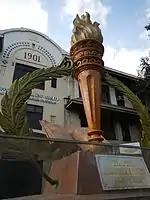
Founded in 1912, The Torch (Filipino: Ang Sulo) is the official student publication of the university. It publishes periodicals and other printed materials funded, managed, and written by the students. The Torch publishes at least seven issues annually with the option of supplements, a special Filipino issue, called Ang Sulo, and a literary folio, called Aklas.
It also holds activities, contests, and events, such as the annual "Liyab", a citywide journalism training seminar for high school publications, the "LitSem" or Literary Seminar workshop, and the Gawad Genoveva Edroza-Matute.[16]
The publication is a member of the Progresibong Lupon ng mga Manunulat ng PNU (PLUMA-PNU) and the College Editors Guild of the Philippines (CEGP).[16]
Notable faculty and alumni
- Josefa Llanes Escoda, patriot and founder of the Girl Scouts of the Philippines
- Aurora Aragon Quezon, former Philippine First Lady
- Mariano Marcos, educator, father of President Ferdinand Marcos
- Conrado Benitez, founder of the Philippine Women's University
- Edwin Bingham Copeland, founder of the UP College of Agriculture
- Cecilio Putong, former Secretary of Education
- Severino Montano, national artist (Theater), former Dean of Instruction of Philippine Normal College
- Esteban Abada, former Senator and Undersectrary of Education
- Genoveva Edroza-Matute, fiction writer, Palanca Awardee, former Dean of Instruction
- Jejomar C. Binay, former mayor of Makati and Vice President of the Philippines
- Salvador Escudero, former Minister of Agriculture and Current Congressman of Sorsogon
- Maria Odulio de Guzman, lexicographer and translator of Noli Me Tangere and El Filibusterismo
References
- AsTEN. "Association of Southeast Asian Teacher Education Network". asten1.org. Retrieved January 6, 2020.
- "Biography: President Bert J. Tuga". Philippine Normal University. Archived from the original on October 3, 2014. Retrieved January 6, 2020.
- Direktoryo ng mga Ahensiya at Opisyal ng Pamahalaan ng Pilipinas (PDF) (in Filipino). Kagawaran ng Badyet at Pamamahala (Department of Budget and Management). 2018. Retrieved February 1, 2021.
- Congress of the Philippines. "An Act Designating the Philippine Normal University as the Country's National Center for Teacher Education, Appropriating Funds Therefor, and for Other Purposes". LawPhil.net. Retrieved December 19, 2010.
- Estioko SVD, Leonardo (1994). History of Education: A Filipino Perspective. LOGOS Publications, Inc. pp. 163–200.
- Quodala, Schatzi (September 3, 2013). "'Did you know: Philippine Normal University'". Philippine Daily Inquirer. Retrieved October 3, 2014.
- "History and Milestones: A Brief History of the Philippine Normal University". Philippine Normal University. Archived from the original on October 3, 2014. Retrieved October 3, 2014.
- Congress of the Philippines (June 19, 1965). "An Act Providing for the Establishment of Regional Branches of the Philippine Normal College and Authorizing the Appropriation of Funds therefor". Chan Robles Virtual Law Library. Retrieved October 3, 2014.
- Lico, Gerard (2008). Arkitekturang Filipino: A History of Architecture and Urbanism in the Philippines. Quezon City: The University of the Philippines Press. pp. 269–270. ISBN 978-971-542-579-7.
- Alarcon, Norma (2008). The Imperial Tapestry:American Colonial Architecture in the Philippines. Manila: University of Santo Tomas Publishing House. p. 93. ISBN 978-971-506-474-3.
- "PNU North Luzon". Philippine Normal University. Retrieved April 10, 2016.
- "PNU South Luzon". Philippine Normal University. Retrieved April 10, 2016.
- "PNU Visayas". Philippine Normal University. Retrieved April 10, 2016.
- "PNU Mindanao". Philippine Normal University. Retrieved April 10, 2016.
- Congress of the Philippines. "Higher Education Modernization Act of 1997". Chan Robles Virtual Law Library. Retrieved October 3, 2014.
- "The Torch Publications". Philippine Normal University. Archived from the original on October 3, 2014. Retrieved October 3, 2014.